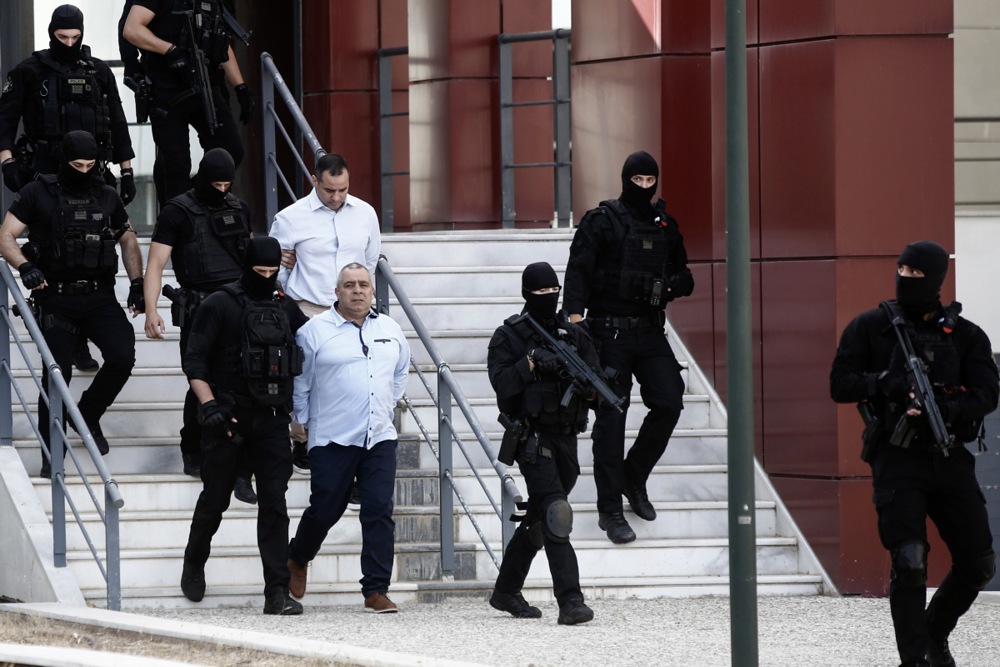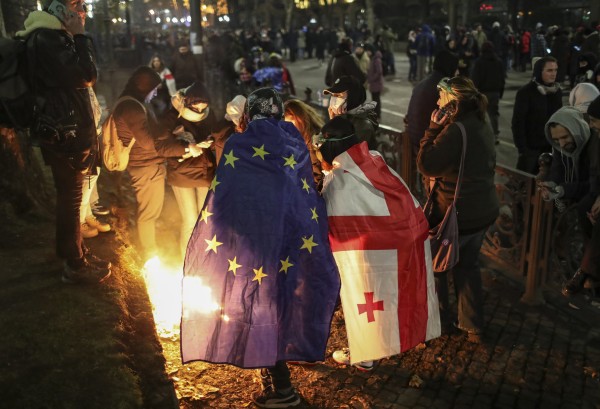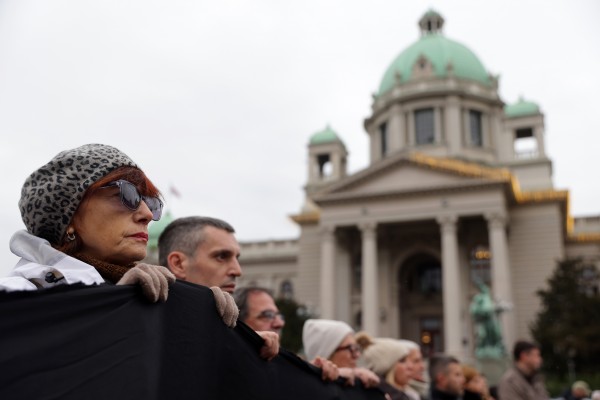Every Friday, journalist Giorgos Karaivaz would bring flowers or sweets home to his wife and son on his way back from the TV studio. But on 9 April 2021, that routine ended in tragedy. As he returned home, a black scooter with two riders pulled up beside him, and ten bullets tore through his body. It was 2:30 in the afternoon, right below his house. The Greek mafia had just executed a contract killing to silence a journalist forever.
Karaivaz’s murder is a deeply complex case, linked to organised crime that leaves few traces and is sustained by very powerful networks. The recently concluded trial failed to uncover the truth, leaving both the perpetrators and those who ordered the murder unpunished.
The pressing questions remain: will the Greek police find them? Why didn’t they request on-the-ground assistance from Europol, an agency with extensive experience handling such cases? Will the Greek state confront organised crime?
Who was Giorgos Karaivaz
Born into a farming family in a small village in northern Greece, Karaivaz pursued his dream of becoming a journalist from a young age. Although he initially aspired to cover political stories, he was assigned to police reporting – a path that, 30 years later, would ultimately lead to his death.
Karaivaz worked as a police reporter for newspapers and television before launching his own website, bloko.gr, in 2009. The site covered police news, finances, unionisation, and other related issues. Through his extensive network of sources, Karaivaz also published opinion pieces, drawing on his deep knowledge of crime and Greece’s shadowy underworld.
In his final months, his writings became increasingly charged, reflecting his knowledge of Greece’s organised crime – a world he could not openly expose. This organised crime network, often referred to as the “Greek mafia”, controls protection rackets for brothels and gambling clubs, engages in extortion, and issues death contracts. It includes retired police officers, lawyers, and other figures from Greece’s underworld. Karaivaz was scheduled to testify in a major case against the Greek Mafia, but he was killed before the trial. His close associates believe he was killed to prevent him from taking the stand.
In one of his final articles, the journalist wrote about the possibility of being “physically eliminated”. And that’s exactly what happened.
A sluggish investigation raises questions about the Greek Police’s cooperation—or lack thereof—with Europol
It was never disputed that Karaivaz was murdered because of his work as a journalist. From the outset, authorities ruled out any personal dispute.
“It is a heinous crime against the freedom of the press” declared the then-Minister of Citizen Protection, Michalis Chrysochoidis. He assured the public that “the Greek police would swiftly find the culprits” and that the Prime Minister would order an “express investigation”.
Yet, for two years, there was only silence.
On 28 April 2023, two brothers were arrested for the murder. The timing was deemed “strange,” as it occurred just one month before national elections.
The Greek police asserted that there was cooperation with Europol; however, police sources clarified to IPI that this cooperation took place solely “by correspondence”, i.e. via email. In other words, at no point during the investigation did the Greek police request Europol’s physical presence or assistance in Greece.
The key question that arises is this:
Why didn’t the Greek police request Europol’s physical presence in Greece to draw on their extensive experience in similar investigations? In Europe, there have been two other high-profile murders of journalists—Daphne Caruana Galizia in Malta in 2017, and Ján Kuciak in Slovakia in 2018. In both cases, domestic authorities invited Europol to assist on the ground. As we confirmed with Caruana Galizia’s family, both Europol and FBI agents were deployed to Malta, where Europol remained “for years, helping the investigation and to ensure that no evidence was destroyed or disappeared.” Similarly, Europol officials were frequently deployed to Slovakia at the request of the authorities to support the investigation and operations.
The second question concerns the actual start date of the cooperation between the Greek police and Europol. Police sources claim that Europol was involved “from the first days after the murder” in April 2021. However, the first mention of this collaboration in the Greek press emerged much later, on April 29, 2023, immediately following the arrests of the accused. Interestingly, this report spoke of the Europol cooperation in the future tense:
“One of the most important tools in the investigation of major cases is being activated by the Greek Police in an effort to find evidence for the other three individuals mentioned in the case file for the murder of Giorgos Karaivaz […] This is the first time this will be done, with results expected in a few months.”
It’s worth noting, however, that there was never any official announcement regarding the cooperation between the Greek Police and Europol.
Back to the two accused – who exactly were the arrested brothers?
The two brothers, aged 40 and 48, were previously charged with robbery but acquitted. The younger brother had also faced charges for a second murder linked to the Greek Mafia but was recently cleared.
They were held in pre-trial detention for 15 months, as Greek law permits, until the Karaivaz trial began in the summer of 2024.
The trial: inconclusive evidence and acquittals
The trial commenced on 26 June. On one side sat Karaivaz’s grieving mother, sister, and widow, alongside their lawyers. Across them were the accused brothers and their defence attorneys.
We find ourselves in the Athens Mixed Jury Court. Here, three judges and four civilian jurors, each with an equal vote, will decide the guilt or innocence of the accused.
The prosecution’s case was mainly based on these pieces of evidence: CCTV footage showing a white van belonging to the elder brother’s disinfection company near Karaivaz’s home the day before and the day of the murder. The accused claimed he was distributing flyers, although it seemed unusual to distribute leaflets in the same area on consecutive days. However, no footage captured the accused on the black scooter confirmed to be used by the assailants.
A homicide detective testified that the van had parked in a camera blind spot where the scooter approached. He suggested that the brothers boarded the scooter, shot Karaivaz, returned to change their clothes and helmets after the assassination, and then made their escape.
The prosecution argued that the brothers’ body types matched those of the attackers seen on camera.
There is no definitive proof that the younger brother was present at the crime scene, although the witness who served as his main alibi presented inconsistencies and contradictions during his court testimony.
The prosecutor recommended “the guilt of both defendants beyond doubt.” She further explained that in cases against organised crime, decisions often rely on compelling circumstantial evidence, as a concrete proof is rarely available. As the motive, the prosecutor pointed to Karaivaz’s extensive knowledge of organised crime and the potential revelations that some feared he might disclose.
Ultimately, the defendants were acquitted, with a 5-2 vote in favour of one brother and a 6-1 vote for the other. Under Greek law, the presumption of innocence means the prosecution must prove guilt beyond a reasonable doubt, which, without concrete evidence like DNA or fingerprints, was not achieved.
The destroyed CD: a mysterious twist
The Karaivaz trial took an unexpected turn when it intersected with the Greek wiretapping scandal. During the proceedings, the prosecutor revealed that a CD containing data from Karaivaz’s cell phone had mysteriously been destroyed – apparently because someone had destroyed it with the use of a stapler.
While various sources suggested that the CD contained only contact names, a prosecutor’s document in our possession revealed that it held far more – including contact history, photos, videos, and messages exchanged with Karaivaz’s sources.
Among his WhatsApp contacts were names strikingly similar to “Dimitriadis”, the Prime Minister’s nephew and former director of his office, and “Kondoleon”, the former head of the National Intelligence Service.
Both stepped down from their positions in August 2022 after revelations about the wiretapping scandal came to light.
Given the role of organized crime and their links with the police as well as the importance the CD had as evidence for the investigation, the question has to be asked, what measures did the authorities take to ensure the integrity of the investigation from attempts to undermine it, and were the circumstances around the destruction of potentially key evidence fully investigated?
Fear—and a pivotal Supreme Court decision awaited
During breaks in the trial, whispers of “pervasive fear” echoed through the courtroom – a testament to the dangerous nature of confronting organised crime.
“There was ample evidence, and every alibi fell apart. But those who refuse to see the truth will never acknowledge it,” Antonis Xylourgidis, one of the Karaivaz family’s lawyers, told IPI.
In a significant development, the journalist’s mother and sister have appealed the acquittal at the Supreme Court. In their appeal, the family’s lawyers highlight the destroyed CD, arguing that it was recorded as “examined and read,” despite no one officially seeing it.
If the Supreme Court agrees, the case will be reopened, and the trial will start afresh.
Meanwhile, Greek police sources informed IPI that “the investigation remains ongoing until the perpetrators are brought to justice.”
No such thing as press freedom without justice
The murder of Giorgos Karaivaz is not only a tragic loss for his family but also a stark warning to Greece’s journalistic community. In a country that ranks last in the EU in the RSF Press Freedom Index, how easily can journalists investigate and publish after such a brutal killing?
“The long impunity for such serious crimes against the press exacerbates this fear. The Greek authorities must bring the perpetrators to justice and restore the confidence and sense of security of journalists,” urges Pavol Szalai of RSF.
Yet, in Greece, 90-95% of organised crime-related murders remain unsolved.
The murder of Giorgos Karaivaz poses a critical question: Will the Greek government, police, and judiciary finally confront the organised crime that silenced this journalist, or will they continue to let injustice, mafia influence, and threats to press freedom prevail in Greece?
This article was produced as part of the Media Freedom Rapid Response (MFRR), a Europe-wide mechanism which tracks, monitors, and responds to violations of press and media freedom in EU Member States and Candidate Countries. The project is co-funded by the European Commission.




